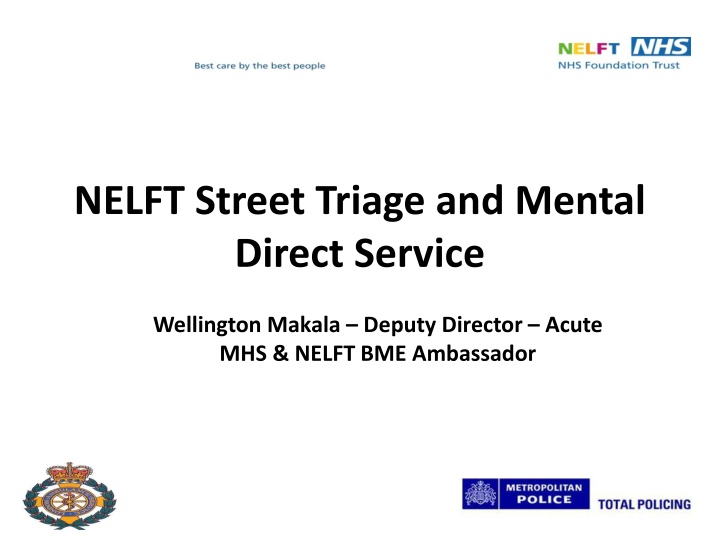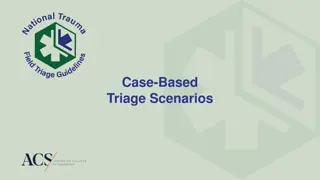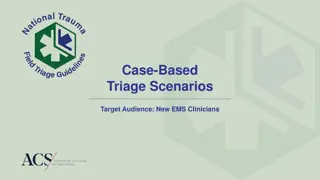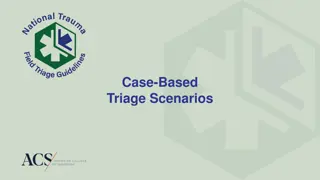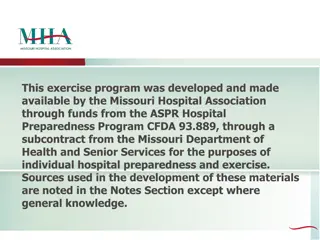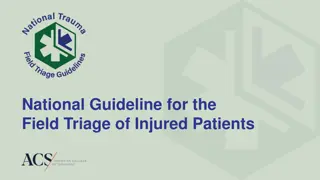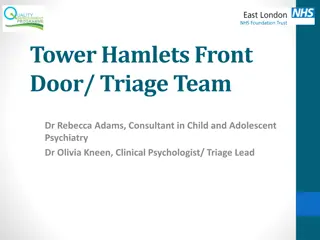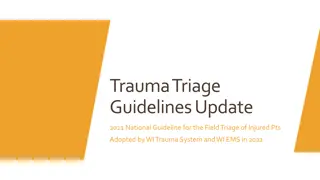Improving Mental Health Crisis Care with NELFT Street Triage Service
NELFT's Street Triage service, led by Deputy Director Wellington Makala, collaborates with police and mental health professionals to provide on-the-spot advice for individuals facing mental health crises. The Crisis Care Concordat emphasizes the importance of joint working between various services to enhance care standards for those in crisis. NELFT's focus on acute crisis care at home and the introduction of the Street Triage Pilot have proved successful in preventing unnecessary detentions under the Mental Health Act. The Street Triage Team, equipped with dedicated phone lines and skilled professionals, operates to offer immediate support and interventions for individuals in need, ultimately aiming to reduce the burden on emergency services and law enforcement.
Download Presentation

Please find below an Image/Link to download the presentation.
The content on the website is provided AS IS for your information and personal use only. It may not be sold, licensed, or shared on other websites without obtaining consent from the author.If you encounter any issues during the download, it is possible that the publisher has removed the file from their server.
You are allowed to download the files provided on this website for personal or commercial use, subject to the condition that they are used lawfully. All files are the property of their respective owners.
The content on the website is provided AS IS for your information and personal use only. It may not be sold, licensed, or shared on other websites without obtaining consent from the author.
E N D
Presentation Transcript
NELFT Street Triage and Mental Direct Service Wellington Makala Deputy Director Acute MHS & NELFT BME Ambassador https://upload.wikimedia.org/wikipedia/en/4/45/LASLogo.jpg
Crisis Care Concordat In 2014 NHS England welcomed the mental health crisis care concordat as an important step forward in improving care and standards for people in a mental health crisis. The Concordat, launched by the Department of Health, is a joint agreement which describes how police, mental health services, social work services and ambulance professionals should work. The Crisis Care Concordat published Guidelines for Commissioning in 2015 which recommended the consideration of 24-hour telephone crisis lines and St Triage police/mental health partnership working as part of a care pathway portfolio of Crisis response services. In these schemes, mental health professionals provide on the spot advice to police officers who are dealing with people with possible mental health problems. https://upload.wikimedia.org/wikipedia/en/4/45/LASLogo.jpg
Why Is it necessary? Policing Mental Health relates to about 20% of police time. Home office, Department of Health and ministry of justice have identified a need to work more collaboratively. Supports the drive described within the new MH concordat. Police Federation raising concerns over the use of S136 MHA powers. Reports outlining that custody is not a place of safety, we should not be criminalising persons suffering from mental ill health. Prevent presentations to accident and emergency departments when a person has no physical health concerns. https://upload.wikimedia.org/wikipedia/en/4/45/LASLogo.jpg
NELFT MHS ACUTE CARE PATHWAY Over the past few years NELFT Acute and Rehabilitation Directorate (ARD) have introduced a real focus on offering acute crisis care in the patients own home as an alternative to acute admission. This has been achieved through Home Treatment Teams who offer an alternative to acute admission. As an extension of that service NELFT have introduced Street Triage Pilot. Street Triage Pilot was launched on 7 April 2015. NELFT joined forces with MET Police to pilot a new project to ensure people with mental issues are prevented from detention under S136 of the Mental Health Act 83. In April 2016 BHRW CCGs agreed to continued funding with the addition of LAS joining this collaboration. he Team covers all 4 NELFT boroughs. Mental Health Direct was launched in January 2015. It has been funded from via a successful joint bid against monies that became available for Crisis services nationally over the winter period. https://upload.wikimedia.org/wikipedia/en/4/45/LASLogo.jpg
Street Triage Team Dedicated phone line for MET/LAS officers 07872 050 047. Three full time band 6 MH nurses. Part time manager band 8a senior social worker. Based at Block 8 Goodmayes hospital IG3 8XJ. 17.00-01.00am. Mental Health Direct Dedicated phone line 03005551000. Bank/Agency Band 6 mental health professionals Currently. Hours 24/7. Fulltime Band 8a Manager. https://upload.wikimedia.org/wikipedia/en/4/45/LASLogo.jpg
Mental Health Direct Mental Health Direct is a dedicated out of hours crisis service staffed by qualified Mental Health professionals-CPNS/Social Workers. MHD is a 24 hour Telephone crisis line and is an integral part of NELFT s Crisis Care Pathway that includes Extended Hours Access Teams, Home Treatment Teams and the Emergency Duty Team. This service has historically not had dedicated clinical or administrative staff, but rather has been run as a sub service of the Trusts switchboard. Available for people who are in crisis or wish to discuss issues regarding their mental health and their carers. Signposting / referrals to appropriate health, social care or support services. Line management support. https://upload.wikimedia.org/wikipedia/en/4/45/LASLogo.jpg
Benefits Of MHD to date Urgent and emergency access to crisis care. Quality of treatment and care when in crisis Access to support before crisis point A reduction in the demand on A+ E departments. A reduction in calls to the NHS 111 service by people experiencing mental health crisis. Signposting to NHS 111 or General Hospital if the calls relate to physical health problems. Less pressure on Home Treatment Teams to provide telephone support whilst out on visits or carrying out assessments. https://upload.wikimedia.org/wikipedia/en/4/45/LASLogo.jpg
Key outcomes Reduced inappropriate or unnecessary use of Section 136 of the MHA. Reduced time spent by MET/LAS officers dealing with those with mental health problems. An improved experience for people who come into contact with the police through either detention under Section 136 or for other reasons related to their mental health. Reduced inappropriate use of A&E as a place of safety. Reviewed and Improved crisis, care and contingency plans for service users. Reduced number of attendances in custody. Improved multi-agency team work. Reduced costs to health, criminal justice system, Ambulance service and Acute Trusts. https://upload.wikimedia.org/wikipedia/en/4/45/LASLogo.jpg
Key elements of the scheme Dedicated phone line and telephone support available to service users experiencing crisis. Dedicated phone line and telephone support available to the MET and LAS from 5pm to 12 midnight. Sharing of information to enable informed decisions to be made by officers on the street/homes about the options available to them. Face to face assessments where appropriate (on the street / people s homes etc.) Onward referrals to appropriate health, social care or support services of individuals who have come to the attention of the police. 7 day follow up those individuals referred on to other agencies. https://upload.wikimedia.org/wikipedia/en/4/45/LASLogo.jpg
Monitoring and Evaluation All referrals are documented on a spreadsheets on shared drive and RIO. Bi monthly meetings with the MET police and LAS leads of all for boroughs. Here we: -Review case studies. -Discuss what has and has not worked well. -Review safeguarding cases. Clinical and management supervision. Feedback from service users, carers and our key stakeholders, uploaded onto Datix compliments. https://upload.wikimedia.org/wikipedia/en/4/45/LASLogo.jpg
UNIQUE SOLUTIONS Better engagement and improved crisis experience with our service users. Less stigmatizing for our service user. Stronger partnership and collaboration with key stakeholders : Developing wider intelligence and information sharing Inc. A&E, GP s. Increasing trust between the MET and LAS to deliver a better service to the public. Sharing information to inform MET decision making at the start of the process ( The more we know, the earlier, the better the decision! ) Still retain the ability to provide a face to face assessment across the NELFT Boroughs. Softer option in that police do not need to exercise power and control, this is in turn less stigmatising / intimidating/threatening to our service user. The desired mode of conveyance being via LAS. https://upload.wikimedia.org/wikipedia/en/4/45/LASLogo.jpg
UNIQUE CHALLENGES Large geographical area/ response times/logistics. Sections of extreme deprivation. Transient population. Limited funding resulting in restriction on our availability as ideally we would want to be 24/7 for the 365 days. Some police officers/LAS still unaware of pilot. This is resulted in unnecessary s136 detentions and presentations to A&E at times. Nationally the incidences of s136 have been consistently high. https://upload.wikimedia.org/wikipedia/en/4/45/LASLogo.jpg
Moving Forward An integrated team model i.e. combined and dedicated team of Street Triage and Mental Health Direct Nurses working under the same management with one identity. Single point of referral which would be less distressing to our service users. Permanency - we believe this would have a direct impact in reducing s136 incidences. Staff development and supervision to ensure good clinical governance and quality assurance. https://upload.wikimedia.org/wikipedia/en/4/45/LASLogo.jpg
Current Mental Health Crisis Service We currently have a number of services providing the crisis and acute response for NELFT with different levels of funding. Some of the services are currently funded through the crisis concordant funds and one of them not funded therefore a cost pressure for NELFT. Bleep Holding Team Section 136 Switchboard Enhanced Mental Health Liaison Service Emergence Duty Team Access Assessment & Brief Intervention Team Emotional Wellbeing Out of Hours Service Street Triage Mental Health Direct Acute Crisis Assessment Team (ACAT) https://upload.wikimedia.org/wikipedia/en/4/45/LASLogo.jpg
Fragmented Crisis Services EMHLS Switchboard Street Triage EDT ACAT Section 136 MHD Home Treatment EWB OOH Bleep holding AABIT
NELFT Integrated Acute Crisis Services MHD Street Triage EDT. EMHLS Section 136 Bleep Holding Home Treatment ACAT EWB OOH Switchboard AABIT New Teams
BHR Integrated Acute Crisis Services Acute Inpatients Police Acute Crisis Services LAS Voluntary Sector AABIT New Teams
Why integrated offer? Single point for all the crisis services for NELFT which would mean doing the day first point of contact being Access Assessment and Brief Intervention (AABIT) and out of hours all referrals would go through the MHS Acute response services. This we believe would give a better service user experience for mental health patients during period of crisis. The integrated offer would make it easy to develop a seamless care pathway for the LD cohort as per TCP programme, we are already providing as part of the integrated offer out of hour for Children and Young Persons in Essex which is funded by Essex. This offers brings all crisis services under one management structure https://upload.wikimedia.org/wikipedia/en/4/45/LASLogo.jpg
